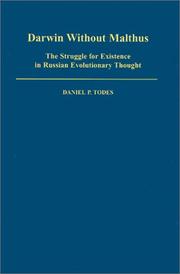| Listing 1 - 10 of 23 | << page >> |
Sort by
|
Book
ISBN: 1136924965 0415760380 1315031396 1136924892 9781136924965 9781315031392 1306345456 9781306345453 9780714612737 9781136924897 9781136925030 1136925031 0714612731 9780714612737 9780415760386 Year: 2013 Publisher: Oxfordshire, England New York
Abstract | Keywords | Export | Availability | Bookmark
 Loading...
Loading...Choose an application
- Reference Manager
- EndNote
- RefWorks (Direct export to RefWorks)
First Published in 1966. Routledge is an imprint of Taylor & Francis, an informa company.
Book
Year: 2019 Publisher: Project Gutenberg
Abstract | Keywords | Export | Availability | Bookmark
 Loading...
Loading...Choose an application
- Reference Manager
- EndNote
- RefWorks (Direct export to RefWorks)
Malthus --- T. R. (Thomas Robert) --- 1766-1834
Book
ISBN: 191218673X 1912186748 Year: 2023 Publisher: [Place of publication not identified] : White Horse Press,
Abstract | Keywords | Export | Availability | Bookmark
 Loading...
Loading...Choose an application
- Reference Manager
- EndNote
- RefWorks (Direct export to RefWorks)
Linner traces the development of an international discourse of crisis through the influence of such thinkers as William Vogt, Fairfield Osborn and Georg Boergstroem, labelled 'neo-Malthusians' for their emphasis on an impending clash between population growth and resource limits.
Food supply. --- Malthusianism. --- Scarcity. --- Overpopulation. --- Malthus --- scarcity --- technology --- sustainability --- population
Book
ISBN: 0295749911 Year: 2022 Publisher: Seattle, Washington : University of Washington Press,
Abstract | Keywords | Export | Availability | Bookmark
 Loading...
Loading...Choose an application
- Reference Manager
- EndNote
- RefWorks (Direct export to RefWorks)
"Does the environment pose limits to human population size and wellbeing? Or does human intelligence and resourcefulness ensure that environmental limits will be expanded and respected? Is a growing population a (or even the) key driver of resource depletion and environmental degradation? How does all of this relate to issues of social justice for people and other species, and for ecosystems and for the globe as a whole? This highly teachable collection of primary source documents traces the issue of the earth's increasing human population and its place in environmental thinking and political action over five centuries. It allows readers to follow discussion about these ideas from early contexts in which they were forged in debates before Thomas Robert Malthus's influential Essay on the Principle of Population (1798) right through to present day. These sources show that concepts such as population, resources, and the natural environment are not self-evident "things," but intertwined concepts with complex histories. Themes across the readings include evolution, eugenics, war, social justice, birth control, environmental Armageddon, and climate change. Other responses to the idea of new "population bombs" are represented here by radical feminist work, by Indigenous views of the population-environment nexus, and by intersectional race-gender approaches. By learning the patterns of this discourse, students will be better able to critically evaluate historical conversations as well as contemporary debates"--
PopulationxEnvironmental aspects. --- Malthusianism. --- Malthus, T. R. --- Population --- Environmental aspects.
Book
Abstract | Keywords | Export | Availability | Bookmark
 Loading...
Loading...Choose an application
- Reference Manager
- EndNote
- RefWorks (Direct export to RefWorks)
Ricardo --- David --- 1772-1823 --- Correspondence --- Malthus --- T. R. (Thomas Robert) --- 1766-1834 --- Malthusianism.
Book
ISBN: 0674027299 0674027078 9780674027077 9780674419407 0674419405 9780674027299 0674419413 9780674728714 0674728718 9780674419414 0674263529 Year: 2014 Publisher: Cambridge, MA
Abstract | Keywords | Export | Availability | Bookmark
 Loading...
Loading...Choose an application
- Reference Manager
- EndNote
- RefWorks (Direct export to RefWorks)
This book could be called "The Intelligent Person's Guide to Economics." The title expresses Duncan Foley's belief that economics at its most abstract and interesting level is a speculative philosophical discourse, not a deductive or inductive science. Adam's fallacy is the attempt to separate the economic sphere of life, in which the pursuit of self-interest is led by the invisible hand of the market to a socially beneficial outcome, from the rest of social life, in which the pursuit of self-interest is morally problematic and has to be weighed against other ends.
Economics --- Philosophy --- Smith, Adam, --- E-books --- Demographers --- Economists --- Population specialists --- Social scientists --- Malthus, T. R. --- Malthus, Thomas Robert, --- Malʹtus, Tomas Robert, --- Ma-êrh-sa-ssŭ, --- Malthus, Robert, --- Author of the Essay on the principle of population, --- Marasasu, --- Essay on the principle of population, Author of the, --- מלתוס, תומס רוברט, --- Philosophy.
Book
ISBN: 9386042568 8132112288 1282839608 9786612839603 8132106148 9788132106142 9781282839601 9788132102977 8132102975 Year: 2010 Publisher: New Delhi, India Thousand Oaks, Calif. SAGE
Abstract | Keywords | Export | Availability | Bookmark
 Loading...
Loading...Choose an application
- Reference Manager
- EndNote
- RefWorks (Direct export to RefWorks)
Markets and Malthus: Population, Gender, and Health in Neo-liberal Times explores the ideas and institutions that were framed at the 1994 United Nations population conference in Cairo and traces their trajectories sixteen years down the line. Why were Third World feminists profoundly critical of the Cairo consensus and process? How has the health of people around the world been affected by neo-liberal economic policies? What have these meant for women's rights, including reproductive rights?. The book presents detailed case studies from various countries ranging from India and China, to Egypt,
Population --- Women --- Population policy. --- Neoliberalism. --- Neo-liberalism --- Liberalism --- Population planning --- Social policy --- Economic aspects. --- Economic conditions. --- Malthus, T. R. --- Malthus, Thomas Robert, --- Malʹtus, Tomas Robert, --- Ma-êrh-sa-ssŭ, --- Malthus, Robert, --- Author of the Essay on the principle of population, --- Marasasu, --- Essay on the principle of population, Author of the, --- מלתוס, תומס רוברט,

ISBN: 1280523891 9786610523894 0195363272 9780195363272 0195058305 9780195058307 Year: 1989 Publisher: New York Oxford University Press
Abstract | Keywords | Export | Availability | Bookmark
 Loading...
Loading...Choose an application
- Reference Manager
- EndNote
- RefWorks (Direct export to RefWorks)
The first book in English to examine in detail the scientific work of 19th-century Russian evolutionists, and the first in any language to explore the relationship of their theories to their economic, political, and natural milieu.
Biology --- Natural selection --- Darwinism --- Selection, Natural --- Genetics --- Variation (Biology) --- Biological invasions --- Evolution (Biology) --- Heredity --- Life sciences --- Biomass --- Life (Biology) --- Natural history --- History. --- Philosophy --- Darwin, Charles, --- Malthus, T. R. --- Malthus, Thomas Robert, --- Malʹtus, Tomas Robert, --- Ma-êrh-sa-ssŭ, --- Malthus, Robert, --- Author of the Essay on the principle of population, --- Marasasu, --- Essay on the principle of population, Author of the, --- מלתוס, תומס רוברט, --- Darwin, Charles, Robert

ISBN: 1280540354 0511214456 0511216246 0511210876 0511315139 0511493320 051121264X 0521581389 0521588715 052118410X 1107142091 9780511216244 9780521581387 9780521588713 9780511493324 9780521184106 Year: 1997 Publisher: Cambridge Cambridge University Press
Abstract | Keywords | Export | Availability | Bookmark
 Loading...
Loading...Choose an application
- Reference Manager
- EndNote
- RefWorks (Direct export to RefWorks)
Originally published in 2004, this is the second and final volume of manuscripts by or relating to Thomas Robert Malthus (1766-1834) that are now held at Kanto Gakuen University in Japan. Volume I, published in 1997, contains 75 items of correspondence. Volume II, now published, contains transcriptions of further original manuscripts, including: four of Malthus' sermons; his diary of a tour of the Lake District; an extensive set of calculations in the bullion trade, suggesting that he was giving serious thought to becoming a bullion trader on his own account; lecture notes on European history from the fifth to the tenth century; his wife's diary of their holiday in Scotland in 1826 and an essay on foreign trade. These previously unknown and unpublished manuscripts promise insights into his intellectual development and the events and circumstances of his life, as well as glimpses of the lifestyle of his wider family and contemporaries.
Economists --- Population. --- Economics. --- History. --- Religion. --- Malthus, T. R. --- Religion, Primitive --- Annals --- Economic theory --- Political economy --- Human population --- Human populations --- Population growth --- Populations, Human --- Malthus, Thomas Robert, --- Malʹtus, Tomas Robert, --- Ma-êrh-sa-ssŭ, --- Malthus, Robert, --- Author of the Essay on the principle of population, --- Marasasu, --- Essay on the principle of population, Author of the, --- מלתוס, תומס רוברט, --- Malthus, Thomas Robert --- Business, Economy and Management --- Atheism --- God --- Irreligion --- Religions --- Theology --- Auxiliary sciences of history --- Social sciences --- Economic man --- Economics --- Human ecology --- Sociology --- Demography --- Malthusianism --- Social scientists --- Correspondence
Book
ISBN: 9781912186730 Year: 2023 Publisher: [Place of publication not identified] : White Horse Press,
Abstract | Keywords | Export | Availability | Bookmark
 Loading...
Loading...Choose an application
- Reference Manager
- EndNote
- RefWorks (Direct export to RefWorks)
Linner traces the development of an international discourse of crisis through the influence of such thinkers as William Vogt, Fairfield Osborn and Georg Boergstroem, labelled 'neo-Malthusians' for their emphasis on an impending clash between population growth and resource limits.
Food supply. --- Malthusianism. --- Scarcity. --- Overpopulation. --- Population explosion --- Population --- Deficiency --- Shortages --- Eugenics --- Food control --- Produce trade --- Agriculture --- Food security --- Single cell proteins --- Malthus --- scarcity --- technology --- sustainability --- population
| Listing 1 - 10 of 23 | << page >> |
Sort by
|

 Search
Search Feedback
Feedback About UniCat
About UniCat  Help
Help News
News